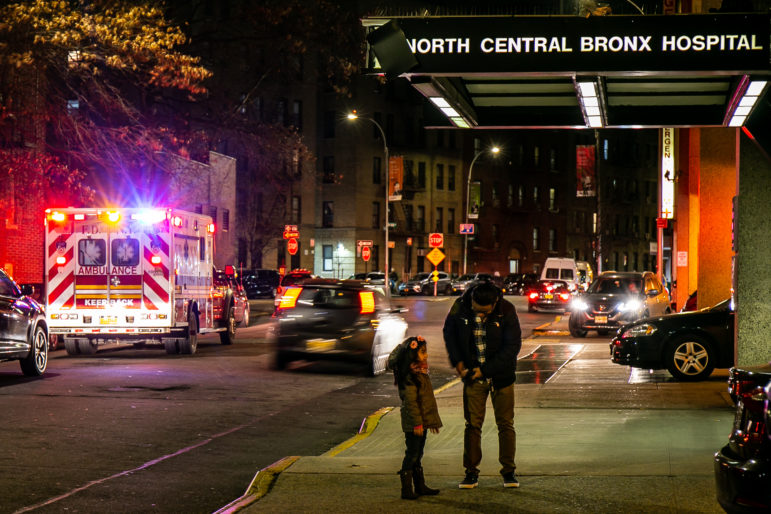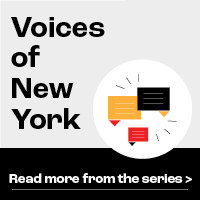
Adi Talwar
Most public benefit programs are not subject to the public charge test, nor is accessing the city’s hospitals, clinics and health centers.After months of legal battles, the Trump Administration’s “Public Charge” rule went into effect on Monday, making it harder for some immigrants to secure green cards—a policy shift that advocates call “a racist wealth test” targeting immigrants of color.
The change, which was implemented after a Supreme Court ruling last month, expands the criteria the government can consider when determining whether to approve or deny an application for a green card, also known as a permanent resident card, which grants a person the right to live and work in the U.S.
Under the prior policy, in effect since 1999, an applicant could be considered a “Public Charge” if they received certain cash assistance benefits or required government-funded, long term institutionalized health care. Starting Monday, the policy now also considers an applicant’s receipt of certain federally-funded benefits including Medicaid, SNAP, and subsidized housing assistance like Section 8 in determining whether to grant a green card. It also looks at a host of other factors, like an applicant’s age, family status, health, education and finances.
“The bottom line is, it’s essentially a wealth test,” says Abbey Sussell, a public charge fellow with the New York Immigration Coalition. “If you are of high income, you are going to pass the test, most likely.”
Fear over implementation of the policy has led to many immigrants disenrolling in public benefit programs, sometimes needlessly. Advocates stress that the rule only affects specific cases; refugees, asylees, U visa holders, domestic violence survivors with Violence Against Women Act (VAWA) status, juveniles with protected immigrant status and other immigrants with humanitarian statuses are not subject to the rule. Neither are legal permanent residents applying for green card renewals or citizenship, according to NYIC.
While undocumented immigrants are not eligible for most of the benefits considered under Public Charge, they would be subject to the test if they apply for a green card in the future, such as if their adult child petitions for one on their behalf, Sussell says.
What’s more, most public benefit programs are not subject to the public charge test, including the Special Supplemental Nutrition Program for Women, Infants, and Children (WIC), and a number of health care services: New York State Medicaid, Emergency Medicaid, Medicaid for pregnant women and children, Child Health Plus, the state’s Essential Plan and the city’s H&H Options plan are not impacted, nor is accessing the city’s hospitals, clinics and health centers. Those eligible for services like food pantries, school lunch programs or shelters would also not be penalized for it under the rule, according to Make The Road New York.
Experts also stress that the use of the benefits that are looked at under Public Charge—Federal Medicaid, SNAP, and housing assistance—does not necessarily mean an application will be denied, just that it’s now among the factors the government will consider. The use of such programs prior to the new policy’s Feb. 24 implementation will not be held against an applicant, and the new rule will only apply to applications postmarked after that start date.
“The way that the test works is they look at a bunch of different factors in someone’s life. The benefits piece is one factor in a long list of other factors,” says Sussell.
NYIC and other advocate groups are urging the city and state to focus on boosting immigrant access to anti-poverty measures, since so much of the Public Charge tests rests on an applicant’s economic status.
“If someone has a higher paying job, they’re more likely to pass the Public Charge [test],” she says. Those who think they could be impacted should seek legal advice before making any changes to their public benefits, she adds.
“These types of decisions are really really complex and difficult for people. They’re weighing all these different things, like should I feel more secure by dropping out of a benefit, or should I make sure I have food and have a job and are healthy, so I can pass the public charge test?”
Despite the Supreme Court implementation, cases in the lower courts about the legality of the rule are still ongoing, and advocates and lawmakers say they’ll continue to legally challenge the policy change.
“The Trump Administration wants to scare us into silence, but this is New York City,” Mayor Bill de Blasio said in a statement. “We are still in court and we will not stop fighting for the rights of immigrants to feed their families.”
The following sources are available for those seeking more information about the Public Charge, including assistance in getting legal advice:
- New Americans Hotline: 1-800-566 -7636
- Make the Road New York: 866-365-2724 ext.123
- ActionNYC hotline: 1-800-354-0365










2 thoughts on “Trump Administration’s ‘Public Charge’ Rule, Explained”
This is all nice but what about Americans who have been putting into the system. It seems largely that the democratic party only cares about immigrants & not the current existing population doing more for immigrants than the working people. These programs ultimately come at the cost of tax payer dollars which immigrants have yet to put into but are ready to take from.
A few facts to consider:
First, even undocumented immigrants–those who cannot access the vast majority of benefits covered by the public-charge rule–pay taxes. “According to the IRS, in 2015, 4.35 million people paid over 13.7 billion in net taxes using an ITIN, a tax processing number issued by the Internal Revenue Service (IRS) to ensure that people – including unauthorized immigrants – pay taxes even if they do not have a Social Security number and regardless of their immigration status.” What’s more, “The Social Security Administration estimates that 75 percent of unauthorized immigrants are actually on formal payrolls, either using fraudulent Social Security numbers or Social Security numbers of the deceased. Unauthorized immigrants pay into Social Security via automatic payroll deductions, but they can never claim Social Security benefits.”
That’s just undocumented immigrants.
Public charge applies to people here legally, or seeking to come here, who want a green card. A green card allows you to work. Working means you pay taxes. So this rule change basically affects people seeking the right to earn money and pay taxes.